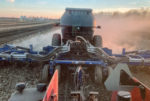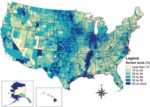Advertise Follow Us
Articles Tagged with ''American Farmland Trust''
News Release
AFT will sponsor and train soil health advisors who can share their expertise with their communities to support the scaling-up of climate-smart agricultural practices
Read More
Strip-Till
Strip-Till & Banded Fertilizer Boost ROI
Farmer’s switch to strip-till pays off in the form of higher corn yields & better bottom line
Read More
No-Tillers, Landowners Must Work Together to Advance Soil Stewardship
Landowner buy-in is critical to boosting the adoption of no-till and other conservation measures on rented farmland.
Read More
A Brief History of Carbon Markets
How global politics, market forces, environmental science and the back 40 are still colliding.
Read More
Less Tillage Could Save Illinois Farmers $9 Million, Reduce Nutrient Loss
The research comes as the state reports an increase in 2019-20 Mississippi River nutrient loads.
Read More



-(1).jpg?height=125&t=1651091749&width=150)





